
Khet Singh Khangar was one of the rulers of Garh Kundar. [1]

Khet Singh Khangar was one of the rulers of Garh Kundar. [1]
Maharaja khet singh Khangar, the son of rajput King Rudradeva, was born on 27 December 1140 in Junagadh, Gujarat, India in the royal family of the Junagadh in Vikram Samvat in Pausha month of Chaitra Shukla Paksha. His father, was the King of Gujarat. He was originally from Banara. He moved to Bundelkhand in 1180 and occupied Junagadh. The 16th century Hindu epic Prithviraj Raso, written by Chand Bardai Rao, indicates that Khangar was in a battle at Jejak Bhakti in 1161 AD during the Mahoba war fought with Prithviraj Chauhan as a commander. The epic describes how the conflict resulted in the killing of Chandela commander's Udal of Mahoba and his brother Alha. [2]

Maharaja Khet Singh Khangar fought several uncertain wars with the help of Prithviraj Chauhan. After the two achieved victory, Prithviraj Chauhan declared Khet as the king of state who was crowned as ruler in 1181 A.D. maharaja Khet singh named this state as Jijhotikhand (in modern-day Bundelkhand) and established the capital at Garh Kundar. [3] The battle of Tarain was fought between Prithviraj Chauhan and foreign invader Muhammad of Ghor, who invaded Delhi and subsequently maharaja Khet singh declared Jijhotkhand as the independent Hindu Republic. [4]

Bundelkhand is a geographical and cultural region and a proposed state and also a mountain range in central & North India. The hilly region is now divided between the states of Uttar Pradesh and Madhya Pradesh, with the larger portion lying in the latter state.
Mahoba is a city in Mahoba District of the Indian state of Uttar Pradesh in the Bundelkhand region, well known for the ninth century granite Sun temple built in Pratihara style. It is also well known for the 24 rock-cut Jain tirthankara image on Gokhar hill. Mahoba is known for its closeness to Khajuraho, Lavkushnagar and other historic places like Kulpahar, Charkhari, Kalinjar, Orchha, and Jhansi. The town is connected with railways and state highways.

Prithviraja III, popularly known as Prithviraj Chauhan or Rai Pithora, was a king from the Chauhan (Chahamana) dynasty who ruled the territory of Sapadalaksha, with his capital at Ajmer in present-day Rajasthan in north-western India. Ascending the throne as a minor in 1177 CE, Prithviraj inherited a kingdom which stretched from Thanesar in the north to Jahazpur (Mewar) in the south, which he aimed to expand by military actions against neighbouring kingdoms, most notably defeating the Chandelas.

The Chandelas of Jejakabhukti was an Indian dynasty in Central India. The Chandelas ruled much of the Bundelkhand region between the 9th and the 13th centuries. They belonged to the Chandel clan of the Rajputs.

Tikamgarh is a town and a tehsil in Tikamgarh district in the Indian state of Madhya Pradesh. The city serves as a district headquarters. The earlier name of Tikamgarh was Tehri consisting of three hamlets, forming a rough triangle. In Tikamgarh town there is locality still known as 'Purani Tehri'. Until Indian independence in 1947, Tikamgarh, formerly called Tehri, was part of the kingdom of Orchha, which was founded in the 16th century by the Bundeli chief Rudra Pratap Singh, who became the first King of Orchha. In 1783 the capital of the state was moved to Tehri, about 40 miles (64 km) south of Orchha, which was home to the fort of Tikamgarh, and the town eventually took the name of the fort. The district is famous for the old fort of Kundar known as Garh Kundar, which was built by Khangars and remained the capital of Khangar rulers from 1180 to 1347.
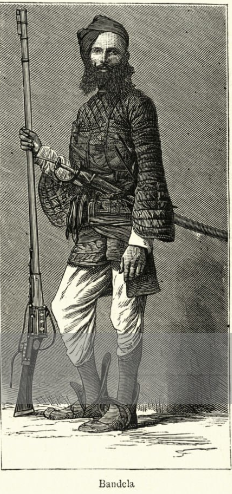
The Bundela is a Rajput clan. Over several generations, the cadet lineages of Bundela Rajputs founded several states in area what came to be known as Bundelkhand anciently known as Chedi Kingdom from the 16th century.
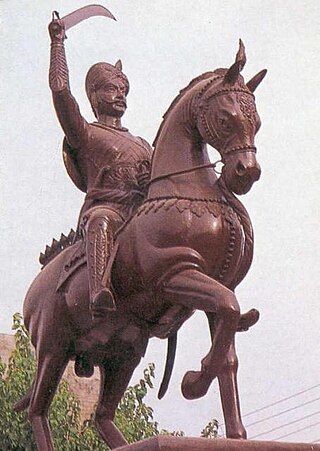
Udal is the name of a legendary 12th century general who appears in the Alha-Khand epic. In the epic, Udal and his brother Alha serve in the army of the Chandela king Paramardi Deva of Mahoba. They belonged to the Banaphar clan, which are of Rajput and Ahir descent.

Maharaja Brijendra Singh was the last ruler of the princely state of Bharatpur (1929–1947) and the successor of Maharaja Kishan Singh. He had also served as the Member of Parliament, Lok Sabha.
Alha was a legendary general of the Chandel king Paramardideva, who fought Prithviraj Chauhan in 1182 CE. He is one of the main characters of the Alha-Khand ballad.
Rajasthani literature is an tradition in Indian literature dating to the 2nd millennium, which includes literature written in the Rajasthani language. An early form of Rajasthani started developing in the 11th century from Saurseni Prakrit as Maru-Gurjar or Gurjar Apabhramsa. Early Rajasthani literature was usually written by Charans. Earlier Rajasthani was known as Charani or Dingal, which was close to Gujarati. Medieval Rajasthani literature was mostly heroic poetry mentioning the great kings and fighters of Rajasthan. Rabindra Nath Tagore, a Bengali polymath, once said, "The heroic sentiment which is the essence of every song and couplet of a Rajasthani is peculiar emotion of its own of which, however, the whole country may be proud". It is generally agreed that modern Rajasthani literature began with the works of Suryamal Misran, including the Vansa Bhaskara and the Vir Satsai. The Vansa Bhaskara contains accounts of the Rajput princes who ruled in what was then Rajputana, during the lifetime of the poet (1872–1952). The Vir Satsai is a collection of hundreds of couplets.
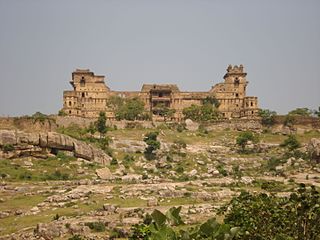
Garh Kundar is a small village in the city of Niwari district of Madhya Pradesh. It has been named so after the splendid fort, or "Garh", of Kundar located here. From 925 to 1507 AD, Garh Kundar fort witnessed many battles and bloodshed. Yashovarma Chandel built the fort after conquering south western Bundelkhand. In the battle between Prithviraj Chauhan and the Chandels in 1182 AD fort commander. Shayaji Parmar lost and the fort came under Prithviraj Chauhan. Then Rajput King Prithviraj Chauhan appointed Khub Singh khangar as the ruler of this fort who founded the Khangar Dynasty afterwards.
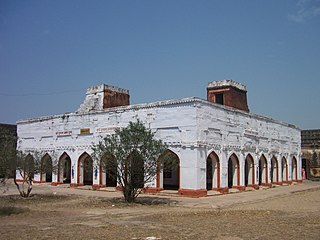
The term Alha Khand is used to refer to poetic works in Hindi which consists of a number of ballads describing the brave acts of two 12th century Banaphar Ahir heroes, Alha and Udal, generals working for king Paramardi-Deva (Parmal) of Mahoba against Prithviraj Chauhan of Ajmer. The works has been entirely handed down by oral tradition and presently exists in many recensions, which differ from one another both in language and subject matter. The Bundeli, Bagheli, Awadhi, Bhojpuri, Maithili, and Kannauji recensions are the most well known among these.

Orchha State was a kingdom situated in the Bundelkhand region and later a princely state in British India. The state was ruled by Bundela clan of Rajputs. It was located within what is now the state of Madhya Pradesh.
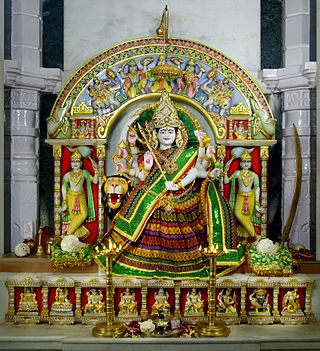
Ashapura Mata is an aspect of Devi, a Hindu goddess. She is one of the kuladevis of Kutch and Rajasthan, and the Jadeja clan of gujarat and Chauhans inhabiting the western indian provinces. She is a goddess regarded to fulfill the wishes of her adherents.

The Chahamanas of Shakambhari, colloquially known as the Chauhans of Sambhar or Chauhans of Ajmer, were an Indian dynasty that ruled parts of the present-day Rajasthan and neighbouring areas in India, between the 6th and 12th centuries. The territory ruled by them was known as Sapadalaksha. They were the most prominent ruling family of the Chahamana (Chauhan) Rajput clan.
Akhil Bharatiya Kshatriya Mahasabha also known as All India Kshatriya Mahasabha was founded in the year 1897 It was formed to promote, protect and fight for rights and interests of Kshatriya community of the Indian society.
Chetavani ra Chungatya is a patriotic Dingal poem composed by Thakur Kesari Singh Barhath in 1903 and addressed to Maharana of Mewar, Fateh Singh, exhorting him to uphold the traditions of his lineage and to not attend the Delhi Durbar. The couplets had the desired effect on the Maharana who decided not to attend the durbar despite being present in Delhi. The work remains one of the great literary works produced during the freedom struggle. It consists of 13 stanzas or sortha (saurashtra-duha).
Uma Shankar Pandey is an Indian social worker who is known for his work and contributions to groundwater conservation. He launched the 'Khet mein Med, Med Par Ped ' campaign in 2005, to conserve water by constructing bunds in the fields. He was awarded the Padma Shri by the Indian government in 2023 for his contributions to social work.
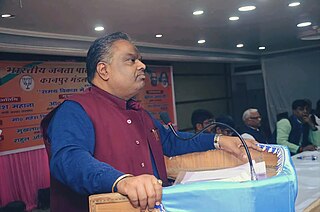
Manvendra Singh Chauhan is an Indian Politician currently serving as a member in Uttar Pradesh Legislative Council. He is a Vice President in the Bhartiya Janta Party state unit of Uttar Pradesh and has been the regional president for Kanpur Bundelkhand region of Uttar Pradesh for BJP organisation from 2016 to 2023. Before 2016 he also served as regional vice president for BJP Kanpur region from 2012 to 2016.